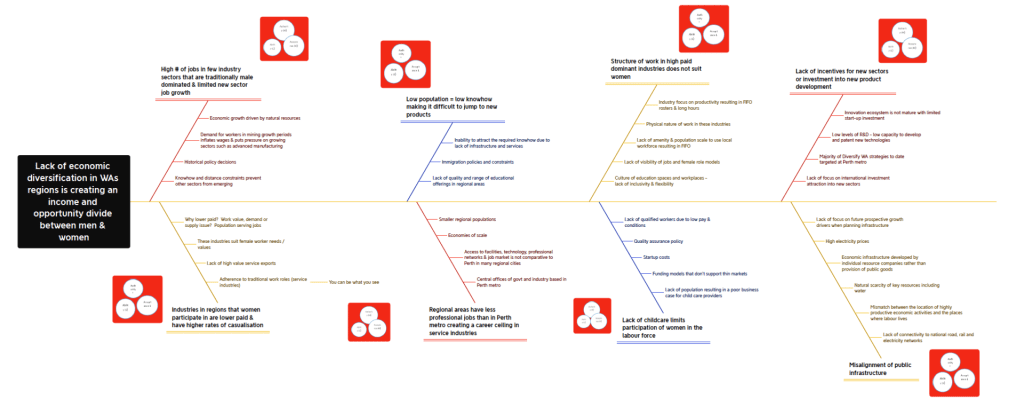Guest blog by Kristie Tonkin, LEG ’23
I have thoroughly enjoyed extending my thinking about how to lead economic growth in regional Western Australia through the 10 week course. I have valued how the course extended my current knowledge, introduced topics new to me, provided a toolkit for future initiative development provided a range of international examples of the concepts discussed, and enabled the practical application of that knowledge through assignments and peer learning conversations.
Amongst the many learnings of the course, I will take forward the following concepts into my future work in regional development:
- Complex versus complicated – we often think our challenges are complicated and have an out of the bag solution, but the challenges we face are often complex and there is not one solution. This thinking will guide my work in considering when I need to work in partnership with a range of stakeholders in a learning by doing approach such as that outlined through the PDIA toolkit and building capability and authorisation as we proceed.
- The power of focusing on defining what the problem is before jumping to consideration of solutions. In future I will seek to bring in a wider variety of perspectives into problem identification with multiple iterations and consideration of which constraints are binding. I will also take a greater focus on unpacking how the scheduling of potential solutions can impact the end game.
- Reinforcement of the need to gain authorisation and continue to build the authorising environment of any action. Building understanding of authorisers buy-in motivations and how to leverage points of influence.
- Consideration of ‘knowhow’ as a key to identifying and building economic diversification opportunities alongside existing factors that we consider such as comparative advantage and market demand. I can see a need to further unpack what we have existing capabilities in throughout Australia, how these may lead to jumps to nearby ‘products’ through growing to connections between our capabilities.
My growth challenge was refined throughout the learnings of the course as I constructed and deconstructed the challenge with some input from colleagues. I was able to reframe along the way, particularly via the why does it matter, to whom does it matter and to whom does it need to matter more questions and development of the Fishbone diagram (see image below). The importance of being able to access data at the Statewide, regional and national levels and drill into key areas of interest was highlighted, as it constrained my analysis and led to the decision to focus on one population group (women) rather than also including Aboriginal people.

Feedback from the peer learning group and tutors has been invaluable in building the learnings and helping to focus on moving to small actions to try out learnings rather than getting stuck in analysis paralysis. The knowledge gained through conversations with international practitioners and engagement with case studies has inspired me to look further afield for best practice examples learning to consider for local contextualisation to our regional challenges more often.
A curiosity for further exploration that has stayed with me throughout the course is how to apply the concepts of knowhow, diversification, and economic complexity at the regional level, with small populations, to develop solutions that drive prosperity for all? Do the learnings apply beyond developing countries to those who are already relatively prosperous but where that prosperity is not equally distributed?
I extend my sincere thanks to my organisation for enabling me to participate in the course, all Harvard-Kennedy Executive faculty involved in the preparation and delivery, my fellow participants and to the many regional development practitioners that the Growth Lab have worked with and have generously shared their learnings through the case studies.
I look forward to taking forward the concepts learnt through further progress of the growth challenge I focused on and many others facing regional communities throughout Western Australia. In doing so I will regularly refer back to the case studies, study notes, readings available and continued connection with my LEG peers.
This is a blog series written by the alumni of the Leading Economic Growth Executive Education Program at the Harvard Kennedy School. 72 Participants successfully completed this 10-week online course in May 2023. These are their learning journey stories.
